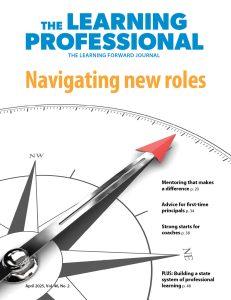The Redesign PD Community of Practice engages teams from 22 of the nation’s leading school districts and charter management organizations in identifying local professional learning challenges and creating scalable solutions. Learning Forward facilitates the community, where teams participate in continuous learning cycles to improve how they manage their professional learning systems.
With diversity in mind, Guilford County Schools in North Carolina is expanding professional learning options for teachers and ensuring that teachers have opportunities to go deeper in their learning. Read more about how their team has made rapid progress in a short amount of time.
Guilford County Schools in North Carolina joined the Redesign PD Community of Practice in 2016 — about a year later than most of the other districts. But that hasn’t stopped the team from making significant progress in improving the coherence and relevance of professional learning for teachers.
Joining the community after the other districts has also given the Guilford team an advantage, explains Tonisha Walden, director of the district’s professional development department.
“We used many of the products [from the other districts] as a starting point,” she says. “That was extremely helpful not to have to start from scratch. It really has been a wonderful experience and has helped grow our thinking.”
A workgroup, including district leaders, principals, and representatives from human resources, curriculum and instruction, and technology, has created a rubric to measure professional learning. Monica Walker, the district’s diversity officer, also joined the team to make sure professional learning addresses issues of equity and disparity.
“We’ve done extensive work in the district on diversity and culturally relevant practices,” Walden says. “We wanted to make sure that was always at the forefront and not seen as a separate piece. It really should be embedded in everything that we do.”
Walker says professional development is about 60% of what her department does, but until now, it was disconnected from other professional learning efforts in the district.
“I feel like for the first time, I’m in a meaningful conversation with everyone,” she says. “This effort begins to streamline, but also to create the collaborative kind of impact that good [professional development] should be about.”
The rubric will allow “everyone to own equity as a priority,” Walker says. “The tool now directs them to think about equity and the tool holds them accountable.”
Providing Professional Learning ‘In a Sustained Way’
The workgroup reviewed data, including their results from the North Carolina Teacher Working Conditions Survey, to better understand what teachers felt was missing in the professional learning already available.
“Teachers did not feel that professional development was differentiated enough,” Walden says. “They did not feel that we were always aligned and relevant to their needs.”
Initially, the rubric, which will be ready by the 2017-18 school year, will be applied to professional learning designed and delivered from the district level. The group created a course development form to guide staff members in matching their sessions or workshops with district goals and priorities, Walden says.
It was also clear from the data, she adds, that teachers need “professional development in a sustained way” and in more than one format. In addition to the face-to-face options, such as Saturday and after-school opportunities, the workgroup also plans to add more online course offerings so teachers can deepen their learning. “What we know from research is that teachers need ongoing, sustained effort on a topic in order to have an impact in the classroom,” she says.
The team plans to gather feedback on the rubric during the first year, make revisions if needed, and then possibly make it available at the school level the following year.
“Participating in the Learning Forward workgroup has provided me with greater insight into how to provide high-quality, meaningful professional development at the district and school level,” says Charles Blanchard, principal at Grimsley Senior High School and a part of the Redesign PD Community of Practice team. “The opportunity to collaborate with school districts around the country was an invaluable learning experience for me.”








